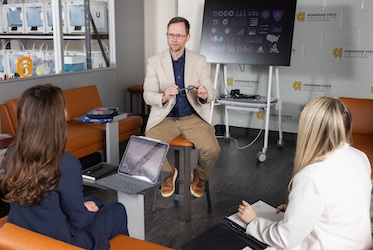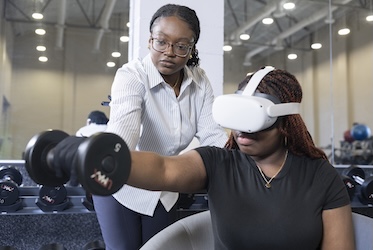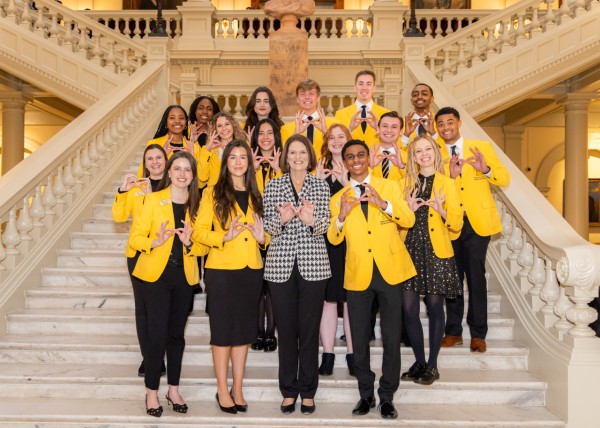
Faculty Brings a Taste of Italy to Students
KENNESAW, Ga. | May 20, 2020
What do you do when a global pandemic prevents 25 students from traveling to Italy for a once-in-a-lifetime, hands-on, study-abroad learning experience in Italy? For Mona Sinha, the answer is that you bring Italy to the students.
Sinha, a marketing professor, was originally scheduled to travel to Italy in May with students in the Michael J. Coles College of Business’s Master of Business Administration program. The comparative business systems course would have included four full-day classes in Atlanta and a seven-day visit to Rome, Florence, and Montepulciano.
However, the class met just once in person before becoming fully virtual. Creative thinking helped Sinha preserve some of the original program’s cultural enrichment opportunities.
“When the study abroad was canceled, I could have turned it into a general international business course with a standard textbook and assignments,” Sinha said. “For many students, it was going to be their first time visiting Italy. It just didn’t seem fair doing a regular class after promising something so different. They were so disappointed that I just had to try and bring some Italian experiences to class.”

One highlight was having Atlanta restaurant Bellina Alimentari host a fully interactive virtual cooking class. The restaurant sent each student the ingredients to make authentic fresh Italian pasta and pizza. Tal Baum, the restaurant’s owner, then led a four-hour live demonstration via D2L Collaborate Ultra.
“Students learned the traditional art of pasta and pizza-making,” Baum said. “And I included many cultural aspects and background history about the dishes we made. Although nothing will replace an actual trip to Italy, I truly hope I was able to shift the MBA students’ minds from the current situation for one afternoon and provide them with a tasty educational experience.”
The experience was an eye-opener for Sinha’s students.
“I will never criticize a restaurant ever again,” said MBA student Adriana Quinones, who is a personal fan of Bellina Alimentari and initially suggested that Sinha reach out to Baum.

“Naturally, this is no substitute for a real site visit,” Kiernan said, “but from the students’ intelligent questions and comments, I am sure they got a sense of the importance of cultural heritage to the economy of Italy, and of the rich art historical and archaeological heritage of Montepulciano itself.”
Anthony Rizzuto, professor and chair of the Department of Architecture, spoke to the class about Roman architecture and history.
"It was a great honor to work with Dr. Sinha and her students,” Rizzuto said. “It was unfortunate that they could not get to Italy this spring, and I felt that it was necessary for them to experience the art and architecture of Rome and Florence, specifically those works and places that are important but not part of the standard tourist fare. They deserved an experience that was more comprehensive and tailored. My hope is that they will be inspired to pursue the trip at a later date."
Because of the major role wine plays in Italy’s culture, Sinha invited Rebecca Hopkins, vice president of communications for Folio Wine Partners, which operates wineries in eight countries including Italy, and Cathy Huyghe, co-founder of Atlanta-based wine analytics firm Enolytics, to present. They spoke about the Italian wine industry’s history, business and the impact of COVID-19.
Huyghe, who writes about the business and politics of wine for Forbes, modeled her presentation after the MBA course she teaches on managing and marketing food and wine for the University of Bologna in Italy.
“Presenting to the KSU students was more of a highlight reel than a full-length film, and, in a way, was more fun,” Huyghe said. “The students and I could engage immediately around concepts they wanted to understand with the most urgency, given our limited time together.”
The cultural activities are a valuable complement to the rigorous, business-focused coursework the MBA students must complete for the course. They have analyzed Harvard Business Review case studies on Italian luxury, produce and hospitality businesses and their final project is to write a case study either on an Italian business entering the U.S. or a U.S. business entering Italy.
“Situations change, but when you know what your teaching objectives are, you have to find a different way to achieve them,” Sinha said.
The approach resonated with her students, who appreciated Sinha’s goal of trying to bring Italy to them through activities like the online cooking class.
“It was obviously no substitution for a trip to Italy, but it was close,” Quinones said. “It was also very emotional to be able to see everybody again during the cooking session. We’ve missed seeing each other.”
The final class in June will feature Keith Perissi, director of the Joel A. Katz Music and Entertainment Business program, and Italian master engineer Martina Albano discussing the Italian music industry.
– Patrick Harbin
Photos submitted
Related Stories

Kennesaw State marketing students apply research skills to the real world by assisting nonprofits

Kennesaw State professor honored by American Accounting Association as 2025 Presidential Scholar

Kennesaw State business student finds research niche in virtual reality

Day at the Capitol: Kennesaw State community members visit with legislators under the Gold Dome
A leader in innovative teaching and learning, Kennesaw State University offers undergraduate, graduate, and doctoral degrees to its more than 47,000 students. Kennesaw State is a member of the University System of Georgia with 11 academic colleges. The university’s vibrant campus culture, diverse population, strong global ties, and entrepreneurial spirit draw students from throughout the country and the world. Kennesaw State is a Carnegie-designated doctoral research institution (R2), placing it among an elite group of only 8 percent of U.S. colleges and universities with an R1 or R2 status. For more information, visit kennesaw.edu.














